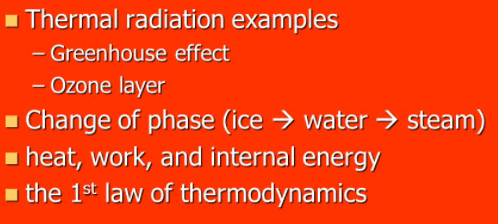Thermal radiation:Definition,examples and properties


Thermal radiation
Radiation emitted by such a body due to its temperature is called thermal radiation. All bodies not only emit such radiation but also absorb it from their surroundings. If the rate of absorption and emission from a body become equal, the body is said to be in thermal equilibrium with its surroundings.
The spectrum of thermal radiation from a hot solid body is continuous with the following characteristics.
1:The higher the temperature, the greater the thermal radiation is emitted. At first, the body appears dim, and then it glows brightly.
Read Also: Heat and Temperature
2:The higher the temperature, the shorter is the wavelength of that part of the spectrum radiating the most intensity. This is supported by the fact that the color of the hot body shifts from dull red through high yellow to bluish-white heat. From the color of the hot body which sees we can estimate its temperature.
Thermal radiation emitted by a hot body depends not only on its temperature but also on the material of the body, its shape, and the nature of its surface. For example, a hot body with a polished surface emits less radiation than does a hot body with a rough surface. Just as properties of real gases can be understood by introducing the concept of an “ideal gas” the properties of thermal radiation can be understood by introducing an ideal radiator”.This is because the spectrum of emitted thermal radiation depends only on the temperature of the radiator and not only on the material, shape, or nature of the surface of the ideal radiator.
Read Also: Examples of conduction of heat
An ideal radiator can be determined by forming a cavity within a black of a material with its walls being held at a uniform temperature. A small hole is drilled through the wall to allow the radiation. Inside the cavity to escape into the laboratory for experimentation.
Such thermal radiation is called cavity radiation or black body radiation or temperature radiation as it depends only on the temperature of the walls of the cavity and not on its material and other factors outlined above cavity radiation help us to understand the nature of thermal radiation just as the ideal gas helps us to understand the matter in its gaseous form. Radiation emerging from the hole of the cavity is much more intense than that from the walls of the cavity.
Learn Also: Conduction, Convection and Radiation
There are three interrelated properties of cavity radiation, all well verified in the laboratory, that any theory of cavity radiation most explains.
1:The Stephen Boltzmann law
The total radiated power per unit area of the cavity aperture summed over all wavelength is called its radiant intensity I(T) and is related to the temperature by the radiation:
2:Spectral Radiancy
The spectral radiancy R(λ) tells us how the intensity of cavity radiation varies with wavelength for a given temperature. It is defined so that the product R(λ) dλ gives radiated power per unit area with wavelength range extending from λ to λ+dλ.R(λ) is statistically distribution function of the form.
Related topics on our website are:
1:Black body radiation
2:Radiation heat transfer
Related Post
Recent Posts
Is energy quantized in classical physics?
No, according to classical wave theory the emission of electromagnetic radiations from the surface is…
Types of laser
Basically, there are four types of laser which includes: Gas Lasers Solid State lasers Liquid…
Ultrasound frequency range
What is ultrasonics? The study and application of mechanical vibrations with frequencies beyond the limits…
Electromagnetic Energy: What are some examples of it?
Electromagnetic energy definition Electromagnetic energy is the amount of energy stored in a region of…
Fundamental units and Derived Units with Examples
The Main Difference between fundamental Units and Base units is that Units that Express base…
Newton’s First law of Motion Examples in Our Daily Life
Newton's first law of motion states that " A body continues its state of rest…